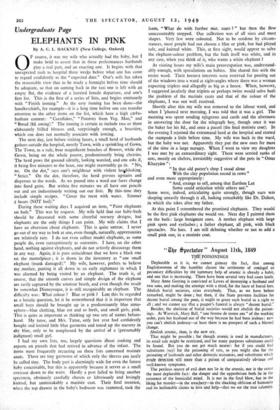"IprOptriatur " August 11th, 1849 TH'E POISONINGS
Deplorable as it is, we cannot gainsay the fact, that among Englishwomen of the humbler classes the settlement of conjugal or pecuniary difficulties by the Summary help of arsenic is already a habit, and one that is increasing. There have been several very bad cases lately.
Mary Anne Geering is convicted at Lewes of destroying a husband and two sons, and making the attempt with a third, for the lucre of burial fees. Abolish burial societies, cries everybody. That, as we have before remarked, might be done ; but then, if the State prevents facilities for decent burial among the poor, it ought to grant such burial as kright to all ; and we cannot say that a pauper's funeral is always "decent burial."
Besides, the abolition of burial societies would not abolish the poison- ings. At Warwick, Mary Ball, "uric femme de trente aria" of the working order, puts her husband out of the way because he had been jealous: now you can't abolish jealousy—at least there is no prospect of such a blessed change.
Abolish arsenic, then, is the new cry.
That might be possible ; for though arsenic is used in manufactures, its retail sale might be restricted, and for many purposes substitutes could be found. But you do not get much nearer: for if you could find substitutes (say) for the poisoning of rats, so you might also for the poisoning of husbands and other domestic nuisances, and substitutes which evade detection still more than a poison of comparatively obvious and well-known symptoms. The perilous source of evil does not lie in the arsenic, nor is the crime the most deplorable fact: the danger and the opprobrium both lie in the existence of the homicidal mind. It is not in the fatal blow, but in the liking for murder—in the treachery—in the shocking oblivion of humanity and its inalienable claims to love and help—that we see the true calamity.






























 Previous page
Previous page